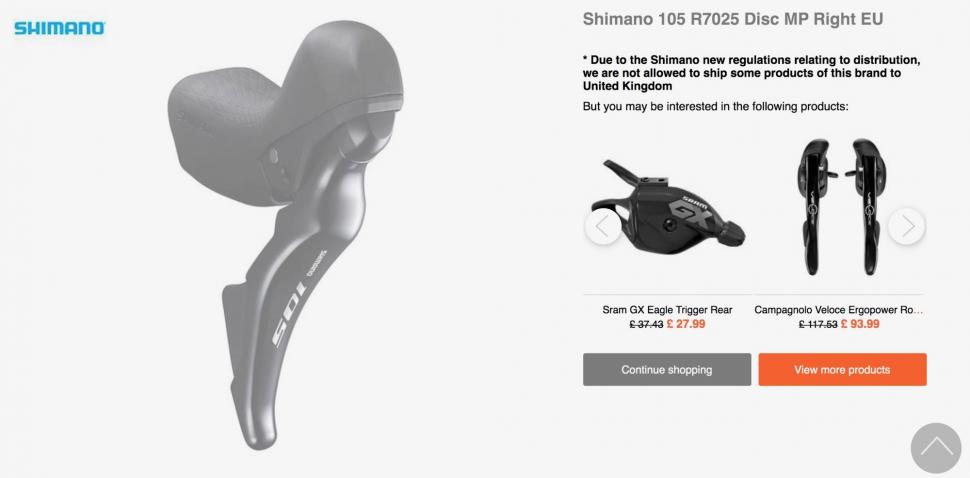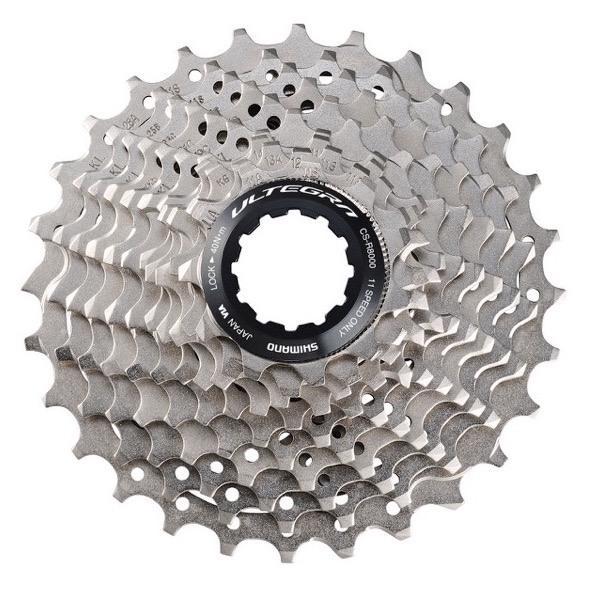- News
- Reviews
- Bikes
- Accessories
- Accessories - misc
- Computer mounts
- Bags
- Bar ends
- Bike bags & cases
- Bottle cages
- Bottles
- Cameras
- Car racks
- Child seats
- Computers
- Glasses
- GPS units
- Helmets
- Lights - front
- Lights - rear
- Lights - sets
- Locks
- Mirrors
- Mudguards
- Racks
- Pumps & CO2 inflators
- Puncture kits
- Reflectives
- Smart watches
- Stands and racks
- Trailers
- Clothing
- Components
- Bar tape & grips
- Bottom brackets
- Brake & gear cables
- Brake & STI levers
- Brake pads & spares
- Brakes
- Cassettes & freewheels
- Chains
- Chainsets & chainrings
- Derailleurs - front
- Derailleurs - rear
- Forks
- Gear levers & shifters
- Groupsets
- Handlebars & extensions
- Headsets
- Hubs
- Inner tubes
- Pedals
- Quick releases & skewers
- Saddles
- Seatposts
- Stems
- Wheels
- Tyres
- Health, fitness and nutrition
- Tools and workshop
- Miscellaneous
- Tubeless valves
- Buyers Guides
- Features
- Forum
- Recommends
- Podcast
TECH NEWS
 bikeinn Shimano regulations - 1
bikeinn Shimano regulations - 1Shimano says it isn't stopping European retailer selling to UK customers
Shimano has denied seeking to prevent UK consumers from buying its products cheaply from European retailers after a Spanish website indicated that it was unable to ship components to this country, leading to internet speculation that this represents the shape of things to come for UK consumers looking to buy cycling products from Europe.
The Spanish website bikeinn is currently displaying this message next to Shimano products if you have shipping set for the UK: "Due to the Shimano new regulations relating to distribution, we are not allowed to ship some products of this brand to United Kingdom."
Do a search of the site for available Shimano bike products and you'll see no results with shipping set for the UK. Switch to shipping to France and you'll get hundreds.
Competition law allows EU consumers to access goods and services from anywhere else in the union without regulatory obstacles. The UK has now left the EU, of course, but all of these rules still apply during the transition period which continues until the end of the year, so UK consumers should be able to buy Shimano products from bikeinn without any difficulty.
It's apparently not a question of Shimano jumping the gun, though, just a simple coding error.
"We understand that this was due to a technical mis-coding on behalf of retailer and they are looking into a solution," says Shimano. "For clarity, all Shimano retailers in the EU are able to sell to UK customers and any deviation to this is a decision of the individual retailer.”
Your complete guide to Shimano road bike groupsets
Could this be the shape of things to come, though? The UK is withdrawing from the single market and the terms of the future relationship are still being negotiated. In theory, your ability to buy from EU retailers could be restricted from the start of 2021, although the government says that the majority of goods imported into the UK would not be subject to additional tariffs.
The prices of Shimano components have increased hugely in the UK over recent months (we're talking about prices you can expect to pay aretailers as opposed to RRPs). For example, Shimano 105 pedals (which have a retail price of £114.99) have increased from £69.49 to £89.99 on Chain Reaction Cycles. However, it's a similar story elsewhere in Europe.
A medium cage 105 rear derailleur is currently £39 on CRC and €43.49 (£38.99) on bikeinn, for example, while an Ultegra R8000 11-speed cassette is £64.99 from CRC and a little cheaper at €64.99 (£58.27) from bikeinn.
Mat has been in cycling media since 1996, on titles including BikeRadar, Total Bike, Total Mountain Bike, What Mountain Bike and Mountain Biking UK, and he has been editor of 220 Triathlon and Cycling Plus. Mat has been road.cc technical editor for over a decade, testing bikes, fettling the latest kit, and trying out the most up-to-the-minute clothing. He has won his category in Ironman UK 70.3 and finished on the podium in both marathons he has run. Mat is a Cambridge graduate who did a post-grad in magazine journalism, and he is a winner of the Cycling Media Award for Specialist Online Writer. Now over 50, he's riding road and gravel bikes most days for fun and fitness rather than training for competitions.
Latest Comments
- S.E. 2 sec ago
I hope she has good advisors on cycling, because no one should ever ride with such a long coat.
- stonojnr 16 min 26 sec ago
Yes it's a waste of time, no one cares enough to fix it. So we have to put up with it unfortunately....
- stonojnr 25 min 48 sec ago
But I thought that was the whole point of black friday, in the UK at least, there are no real discounts, most stuff is sold cheaper during the year...
- I love my bike 50 min 17 sec ago
It's in the land of the sidewalk, for better or worse, that driving 'right of way' does exist. . . and many other things they can keep as well!
- IanGlasgow 2 hours 1 min ago
CHPT3 is in receivership. Their website replaced by this notice. https://chpt3.com/
- Paul J 2 hours 30 min ago
So Froome basically chickened out on actually trying against Contador?...
- Supervet 2 hours 47 min ago
I have started holding my breath for 5 x 30 seconds, that increases EPO, rebreathers not required....
- eburtthebike 2 hours 50 min ago
Not sure how popular. He just about hung on to his mayoral seat in the recent elections, frequently touted as a tory success.
- chrisonabike 3 hours 59 min ago
Generally agree but with caveat - we have over time achieved "road safety" at the expense of vulnerable road users (eg. their convenience, or...


Add new comment
61 comments
They've been published.
Look them up.
Cheers, missed that. Will be interesting to see if we're allowed to apply them immediately.
As soon as the transition period ends we can apply our own tariff rates.
I expect they'll be lowered even further once/if an EU trade deal is done.
Yes, we can in theory, although there is always the possibility of appeal where rates are suspected of being counter to WTO rules - highly unlikely in this case and those disputes inevitably drag on and/or are ignored. Having spent a few years at the coal face of import/export the thing i'm really feeling sorry about for those still in the trade is the increase in declarations and processing, and with nowhere near enough infrastructure to handle it efficiently for continental trade. It was such a relief as we slowly got rid of so much of that - right pain in the ass it's coming back.
AFAIK the WHO don't intervene if you set tariffs at a lower rate than their maximum.
I don't think the WHO are likely to intervene at all. They've rather got their hands full with Covid-19 and Trump planning to pull their funding at the moment.
Good point!
Maybe they'll pass it along to the WTO instead...
No, generally the WTO doesn't intervene directly at all by itself, but countries can appeal to the WTO for things like anti-competitive import restrictions/rates, state aid and so on. The two rate related things that immediately come to mind are large rate increases and zero-/trivially-rated imports - the latter can be important whether or not the trade is just strictly two-way and is rightly not always seen as benign.
I wouldn't bet on that.
Lowering tariffs on imports of bike parts may not be the top priority for a government that insists on taking the UK out of the world's largest tariff-free zone.
If you follow the rest of the comments you'll see that the government is lowering tariffs on bike components.
Unlikely. Initially, we are likely to WTO rules tariffs, which are higher. After that, it will be whatever terms we negotiate with Japan. However, these are likely to be less favourable term than the EU could obtain as we are offering a smaller market to sell to. It's the same reason Sainsbury's pay less for eggs than your local corner shop...
Still, it'll be worth paying the extra if we can put our passports in a different coloured cover...
It's incredible how many people don't have a clue how tariffs actually work.
We can set tariffs as low as we want.
The only catch is that we have to set the same tariff for every country which we don't have a trade deal with.
The idea that WTO tariffs are automatically higher is nonsense.
The government have published what the tariffs will actually be.
They will be lower than they currently are.
The tariffs will be applied to the country of manufacture, so more likely to be Taiwan/China for most bike parts rather than Japan.
They may be lower, and for goods under suspension they will, presumably, be higher unless we zero rate them.
As for setting whatever rate we want, of course we can - but that can have consequences for onward trade.
The ones that have been published are either lower or the same.
That covers a huge amount of cycling paraphernalia.
We'll have to wait and see on the suspended ones.
As things stand tariffs will be lower.
Indeed that does look how things stand, although obviously it's not that simple in the real world (especially for those liberated zero rate items) when the whole round-robin of traders start looking at it. We may indeed be living in interesting times....
I look forward to seeing the implementation in practice.
Not knowing about tariffs myself, can you explain why we would enter into a trade agreement with another country and then impose higher tariffs than our WTO tariff? If the other country would face higher tariffs, then why would they want a trade agreement with us? (I'm assuming that there are other priorites than tariffs for entering into a trade agreement, but don't know what they may be).
AFAIK you can't impose higher tariffs than those permitted by the WTO unless there are exceptional circumstances.
I'm not aware of any trade deals that have higher tariffs than the basic WTO tariffs maximum.
While negotiating trade agreements it's not a good idea to lower your WTO tariffs too far as this reduces the incentive for a country to strike a deal.
If, for example, the UK zero rated its tariffs on Oranges this would reduce prices for UK consumers but would remove an incentive for the EU to strike a deal.
So, at present, the UK government may not want to cut WTO tariffs too far for anything produced in the EU as this removes an incentive for the EU to strike a deal.
If an EU deal is struck then we may see more aggressive tariff cutting, the tariff schedule originally proposed was far more aggressive than the most recently published version.
So, if I'm understanding you correctly, that means that WTO tariffs are the effective maximum tariffs per product (as reducing them too low removes the incentives to strike deals) though we can unilaterally put them as high or as low as we want.
We can't put them any higher than the WTO maximum.
If, for example, WTO tariffs on Oranges are 10% we can set Tariffs at any point between 0% and 10% entirely at our own discretion.
The catch is that they have to be exactly the same for all countries that we do not have a trade deal with.
So if we left the EU without a deal we would have to apply exactly the same tariff rate to EU imports as we did to those from China.
Most countries strive for 0% tariffs on their exports so if we decided to unilaterally set all our tariffs to 0% there would be little incentive for many countries to strike trade deals as they wouldn't have a huge amount more to gain.
It's a bit of a balancing act but by being outside the EU we can focus our tariffs far more. This will mean lower prices for UK consumers on a wide range of goods.
Okay, so what did you mean by "The idea that WTO tariffs are automatically higher is nonsense" when it appears that WTO tariffs are higher?
Because they're not automatically higher.
A WTO tariff could be set at 0% by the UK while the EU's Common External Tariff may be 20%.
Just because we're trading on WTO terms it doesn't automatically mean that tariffs will be higher than they currently are. Bicycle components being a good example.
This was a common piece of misinformation that was repeated in the pro-remain press. As this comments section shows it gained a lot of traction and people assumed that everything would be much more expensive on WTO terms.
So you meant that WTO tariffs aren't automatically higher than the EU's tariffs, whereas WTO tariffs will be higher than the UK's potential deal tariffs?
'WTO tariffs' isn't really a thing. There are no universal tariff rates or maximums. Each country, when it joins the WTO, commits individually to a schedule of ceiling rates for different types of goods. It can't then charge more than those rates without renegotiating its membership. It can charge less than those rates, provided that it charges the same lower rate for everybody. It can also then charge less than its general rate for countries it has a free trade agreement with.
As I understand it, the UK has committed to the same ceiling rates as the EU (presumably this makes independent accession easier). However, the actual rates it chooses to apply could be lower or higher* than the current actual EU rates. From a brief poke around it looks like they're generally either the same or slightly lower, but that's based on a fairly limited sample of goods categories.
[* Provided the EU isn't already charging at the ceiling rate.]
The WTO tariffs won't automatically be higher than the existing EU tariffs.
Given that the EU is quite protectionist the tariffs that we choose to set are quite likely to be lower than those that the EU chooses to set.
Trade deals are usually lower than WTO tariffs so any deal with the EU (or anyone else) should result in lower tariffs than those we choose to set for our WTO tariffs.
No there actually won't be noticable differences, since the tariff is on the wholesale price, not the retail price, so it's a small percentage of a percentage of the total cost.
The Brexit debate has been led by a focus on tariffs, which are very low pretty much across the board these days, rather than a focus on non-tariff barriers, which remain a big problem.
IMO the big impacts will come from the loss of access to exports of services, which are a big slab of our economy, and a British success story.
We won't have to take orders from Brussels. WE'RE TAKING BACK CONTROL.
We?
and giving that control to unelected DumbDom... Rule Brittannia
It's so good that someone else gets that we won't be ruled by those unelected bureaucrats any more. We're so lucky we live under the benign rule of that enlightened alien despot; Dominic Cummings. You know, the one we voted for.
Is this satire? Surely u can't be serious.
What do you mean by that? Can you give examples?
Pages